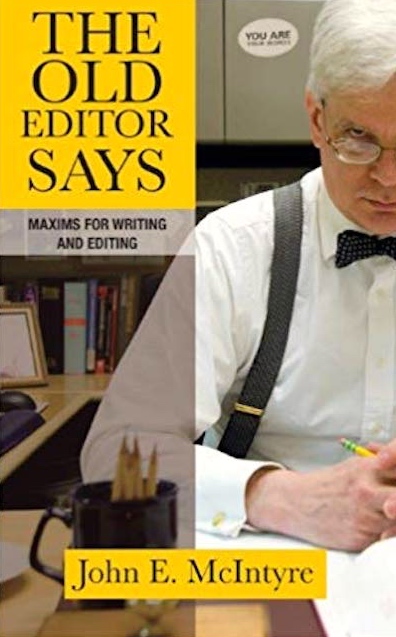The author of the little — 67-page — guidebook The Old Editor Says: Maxims for Writing and Editing (first published in 2013), the old-school newspaper editor John E. McIntyre, writing as a curmudgeonly, sometimes imperious, character of the same name, as seen on the book’s front cover:

(#1) The name of this image file is McIntyreOldEdtor.jpg; that fact will eventually become significant
From the publisher’s copy:
Many beginning writers and editors benefited from a crusty old editor’s brisk maxims about the craft. If you want to be reminded of those days, look inside. If you want to learn those brisk maxims, many of them are collected here. And if you aspire to become a crusty old editor, this is the handbook.
This is not the world of Will Strunk, ± E.B. White, but a world of hard practicalities (p.12: “If your mother says she loves you, check it out”; p. 34: “Get the names right”; p. 35: “If you are not possessed of a perpetually filthy mind, you are ill-equipped to edit”; p. 63: “Don’t keep the good liquor where the staff can get at it”) set in a moral universe populated by the writer, the reader, and the editor (p. 19: “The reader doesn’t care how hard you worked on that story”; p. 23: “Reporting ain’t stenography”; p. 25: “Always honor the writer’s intentions. If they can be discerned and make any sense”; p. 26: “You can’t fatten poor stock”; p. 30: “Giving a reporter a thesaurus is like giving a toddler a loaded handgun”).
There are some specific injunctions, though all of them illustrate some larger point (expanded on in the paragraphs that follow the maxims):
p. 29: “Said” suffices.
p. 43: Use the God-given delete key on these: “controversial,” “dramatic,”, “legendary,” “massive,” “prestigious,” “storied.”
p. 44: “Coveted” is as empty a piece of padding as “prestigious.” Thou shalt not covet.
p. 45: “If the house you’re writing about isn’t Blenheim Palace, don’t call it “stately.”
p. 46: The next time you use “to die for” in copy, we can make that happen.
p. 47: “If you write “in the wake of” something, that someting had better be a boat.
p. 48: Kid, there are two places you want to stay away from when you write: gritty streets and leafy suburbs.
p. 49: If you cover cops, try not to write like a cop. You know, “ejected from the vehicle.” Like that.
If you follow the You Don’t Say blog, you’ll discover that in addition to the curmudgeonly JEM, there’s also a joke-telling performer JEM and an earnest, decent JEM striving to honor his working-class origins, to examine his beliefs and critique his own actions, and to generally live up to a demanding moral code for daily life. A characteristic passage from his blog, from “You don’t want to go home again” from 9/20/14, with the take-home:
I neither miss nor long for that insular white, evangelical Protestant, anti-intellectual culture I grew up in [in the hardscrabble Appalachia of Kentucky], or its many bigotries, genteel or otherwise.
It is not coming back, and it ought not to.
And now the last two pages of the text, with a bit of autobiography and a final maxim about typos:
There are people — may they fry in the sulfurous flames of hell — who exult in finding typos in the work of writing professionals (like John or, in fact, me), so that they can accuse us of hypocrisy, of not knowing how to spell, or of manifesting contempt for our readers.
Inadvertent errors are a fact of life. Human beings are not designed for error-free performance — but they are designed to generously (and silently) disregard errors, to empathetically gauge intentions amidst a certain amount of noise. A wonderful social ability that in fact makes it extremely difficult to detect errors and root out every one.
When you speak or write in bursts of enthusiasm or inspiration, in the flow, you’re probably going to make a fair number of errors. So with John — I’ve caught some of them in the first versions of his postings — and, big time, with me. In particular, my poor nerve-damaged, arthritis-inflamed fingers regularly don’t hit keys with enough force to register, so my typing is riddled with dropped letters. There’s really no solution here: I can set the keys to register with less force, but then my typing is riddled with extraneous letters; or I could try to master a technology for voice-operated texting, but that just brings in a whole fresh set of errors; or I could submit to spellchecking programs that bring the flow of my writing almost to a halt. So I muddle along and do the best I can to find and fix the dropped letters, but some get through — as in McIntyreOldEdtor instead of McIntyreOldEditor (I eventually noticed it, but by then the filename was stored in three different places, so I just let it go).
In any case, as John says on p. 10: “If you’re your own editor, you’re working without a net.” Sadly true, but many of us don’t have staff, so we’ll end up depending on the good will of our readers.

February 4, 2019 at 3:01 pm |
[…] Zwicky talks about language, editing, and […]